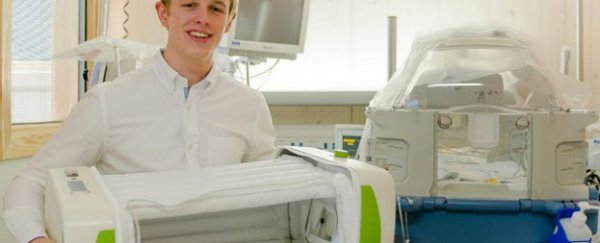Premature babies are often placed into an incubator to keep them warm and protect them from infections until they're ready to make it on their own. Unfortunately, incubators are extremely expensive and require constant electricity, making them difficult to use in developing countries. This means that premature babies born in developing countries are at a very high risk of dying, without receiving a chance to fight for their lives.
To help change the situation, James Roberts, a graduate student from the UK, has created the world's first cheap, inflatable incubator that can be used in developing countries to keep these babies alive.
Inspired after watching a documentary on the number of premature babies dying in Syrian refugee camps, his prototype device, named 'MOM', costs just £250 (approximately A$450) - while an average incubator costs £30,000 (approximately A$55,000).
His amazing cost saving was achieved by replacing the aluminium and glass frame of a normal incubator with inflatable plastic panels that are blown up manually. The panels are kept warm by a ceramic heating element that uses very little power, and can be run by a wall outlet, generator, or even a car battery.
MOM is also fitted with a phototherapy light which can treat jaundice - a common condition in premature babies. The unit is fitted with a small Arduino computer, which controls the heat, humidity and phototherapy light.
After a baby is taken out of MOM, it can be sterilised for reuse, or collapsed for easy storage or transport.
"Normally with incubators it costs loads to get them anywhere because you need huge boxes to put them in, and that can cost a lot to put on a flight," Roberts told Leo Kelion from BBC News. "This one can go in care packages already used for refugee camps."
Roberts received the 2014 James Dyson Award, and is planning to put the prize money towards more prototypes and testing. He hopes that MOM can be made into a commercial product and used by charities and organisations in developing countries.
Source: BBC News
